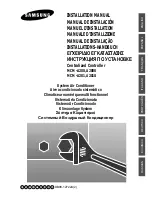
2
|
General safety precautions
Installer reference guide
12
(A)RXF20~42C5V1B
R32 split series
4P519439-10J – 2021.06
WARNING
Take sufficient precautions in case of refrigerant leakage. If refrigerant gas leaks,
ventilate the area immediately. Possible risks:
▪
Excessive refrigerant concentrations in a closed room can lead to oxygen
deficiency.
▪
Toxic gas might be produced if refrigerant gas comes into contact with fire.
DANGER: RISK OF EXPLOSION
Pump down – Refrigerant leakage.
If you want to pump down the system, and there
is a leak in the refrigerant circuit:
▪
Do NOT use the unit's automatic pump down function, with which you can collect
all refrigerant from the system into the outdoor unit.
Possible consequence:
Self-
combustion and explosion of the compressor because of air going into the
operating compressor.
▪
Use a separate recovery system so that the unit's compressor does NOT have to
operate.
WARNING
ALWAYS recover the refrigerant. Do NOT release them directly into the environment.
Use a vacuum pump to evacuate the installation.
NOTICE
After all the piping has been connected, make sure there is no gas leak. Use nitrogen
to perform a gas leak detection.
NOTICE
▪
To avoid compressor breakdown, do NOT charge more than the specified amount
of refrigerant.
▪
When the refrigerant system is to be opened, refrigerant MUST be treated
according to the applicable legislation.
WARNING
Make sure there is no oxygen in the system. Refrigerant may ONLY be charged after
performing the leak test and the vacuum drying.
Possible consequence:
Self-combustion and explosion of the compressor because of
oxygen going into the operating compressor.
▪
In case recharge is required, see the nameplate of the unit. It states the type of
refrigerant and necessary amount.
▪
The unit is factory charged with refrigerant and depending on pipe sizes and pipe
lengths some systems require additional charging of refrigerant.
▪
ONLY use tools exclusively for the refrigerant type used in the system, this to
ensure pressure resistance and prevent foreign materials from entering into the
system.
▪
Charge the liquid refrigerant as follows:













































